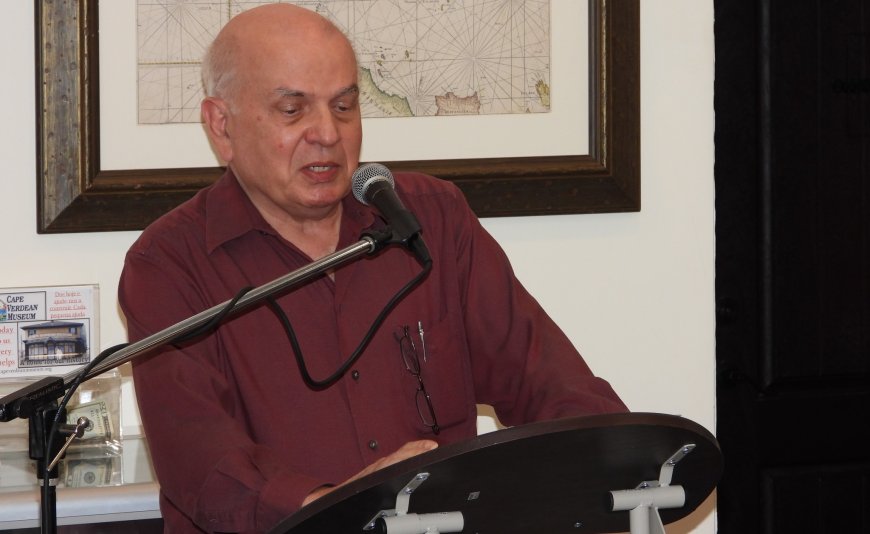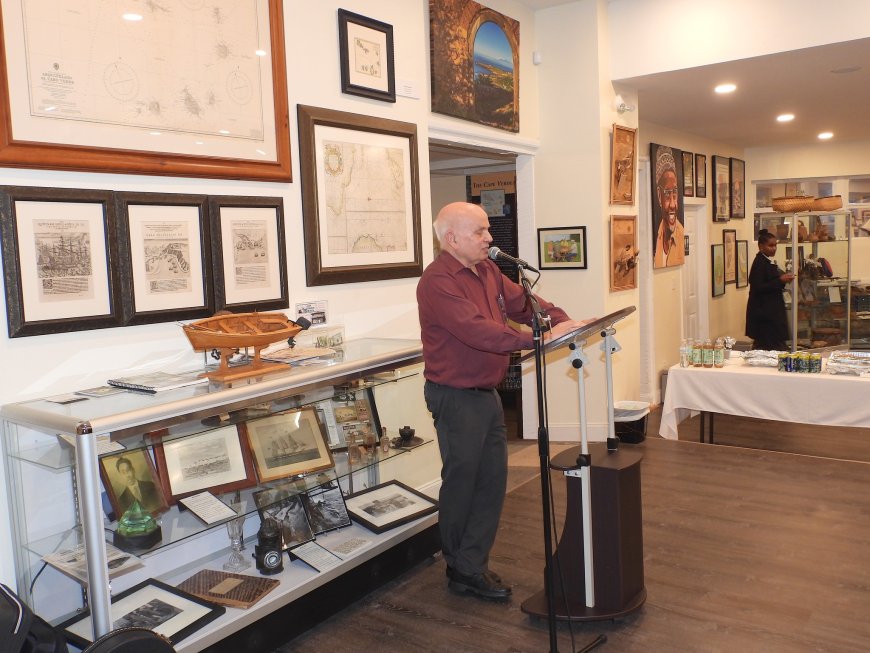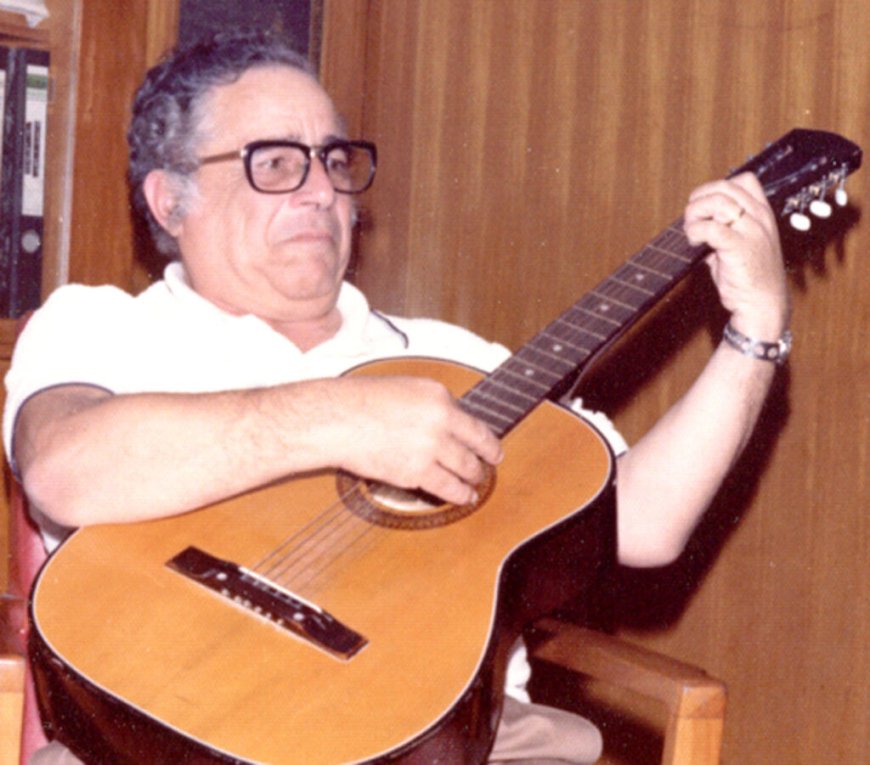Born in Lisbon, this Sagittarius man saw the light of day for the first time on December 21, 1916, at number 100 Calçada do Marquês de Abrantes, with Santo Antão's Cape Verdean mother and Brava's father.
Son of Navy Captain Jovino de Oliveira, he arrived at Ilha Brava when he was just 4 years old. In the care of his grandmother D. Guiomar de Oliveira, from the age of 4 to 11, he got to know, internalize and experience all the specificities of Brava culture at the time.
At the age of 11, he went to the city of Porto for primary and secondary studies and stayed in a boarding house with 3 friends from Braga: Dr. Júlio Pinheiro (by the way, my father), Dr. João Parma Pinheiro and Dr. Telmo Crato Monteiro . Having finished the sixth year of high school at the age of 17, he decided to return to Ilha Brava, missing his childhood Island and also his grandmother.
He remained for 8 years on his beloved Ilha Brava, having experienced, during that period, all the vicissitudes of youth and adolescence, which gave him a very special profile as a beloved poet and one of the most celebrated by the people of our Island of Flores, and not only...
It was then, and during this period, that he produced all his poetic work.
Talking about Rodrigo Peres is talking about poetic sensitivity, it's talking about the love for the land that saw him grow, it's talking about the descriptive power of the day-to-day activities of Brava, it's also talking about unconditional love that we only find in great poets.
But, to talk about Rodrigo Peres, it is not enough to praise the poet's human qualities. We must necessarily analyze the lyrical part of his compositions.
Regarding the content of the compositions, Rodrigo Peres is perhaps one of the composers with a range of the most varied themes covered in Mornas Bravo, dealing with love, gratitude, jealousy, heartbreak, tribute, longing, etc., etc. ..
His most frequent partner was José Medina who, among others, lent his musical sensitivity to embellish and further highlight Rodrigo Peres' poetic vein.
In his extensive work, which includes a total of 22 poems in Portuguese and 40 texts in Creole, he addressed diverse themes ranging from the jocular, as in the warm "'N CREBO CUMÂ BO CREM", showing a funny dispute between two loved ones .
Here I present some grafts from this warm...
...
" 'N ta amâbo cumâ bo amâ'm,
'I don't believe it as I believe it,
Dixâbo si bo dixâ'm,
Do it cumâ bo do it.
In the end it remains only to follow,
Poor di mico bó
I don't deal with what I'm dealing with,
In everything I have to imitate.
...
Si ba until I fall
'I'm not in trouble when I fall,
I treat like I treat
I pay in the same coin."
Going through the descriptive, as in the warm "NHA TEMPO DI MENINO", where he describes his childhood in great detail.
"Sodade, dja'm sodade!
Di us home, we portom,
In our backyard without tiling,
Qui'm ta djugâba piom,
Di bento behind the cleaver
I'm a parrot with mom."
Aware of the political situation of his time, Rodrigo Peres salutes, in "Morna de Vitória", British General Montegomery for his performance in the Second World War.
He also did his best to humanize the places on Ilha Brava where he grew up, which are described and praised in the warm "DJABRABA", also known as "GREJA D'OCEANO", set to music by Virgínio Pereira...
...
"Djabraba, happy with a smile,
May Nhôr Des be blessed,
by transformer bo tchom
in a corner of paradise"
...
"Vila is a fresh and dark face,
Be brave and press it in Lém."
At the same time that he praises love in the form of a beloved woman, Rodrigo Peres also manages to say: "Mudjer is false, mudjer is piçonha, bejo qu' el dâbo é resto di oto home", as in the warm "MUDJER É FALSO".
And moving on to the most sublime love, we have the warm "'N CREBO FORA DE MARCA", one of his best-known themes and dedicated to a great passion of his youth, where he compares the usual everyday life with the most sublime love. poignant, where the expressions "'N CREBO MÁS TCHEU QUI PRANTA CRÊ AGO" and "MÁS QUI COMIDA CRÊ SAL" highlight the simplicity and lyrical depth of this author. At the same time, and in the same morna, he also did not fail to pay homage to the great writer and poet Eugénio Tavares with the following comparison: "'N CREBO CUMA DJABRABA CRÊ MORNAS DI SÊ TATAI".
Speaking of musical partnerships, in addition to the mornas that he himself wrote, José Medina (who was his most frequent partner), Alvaro Soares, Hilário Galvão, Guilherme Dantas, Virgínio Pereira, Djedjinho and A. Almeida stand out.
And continuing with his family path, he embarked for the USA, living in New York and New Jersey, where he worked on the Porto tugboats. Afterwards, he left for Lisbon where he started a family. He worked as a Merchant Marine officer on the boats of an American company flying the Liberian flag.
He never picked up a pen to write again saying that his inspiration was his own
Island and the people of that time, leaving a gap that remains to be filled to this day.
At the invitation of the then President of the Ideal Club, of East Bridgewater, he visited our community in 1989, when he was honored with two mornas.
Along with a morna written by José Galvão Sousa, better known as Fuca, paying homage to the poet, I also had the honor and happiness of writing a few verses, set to music in the form of a morna, which was presented on the occasion of his last visit to these New England lands.
Initially I describe the Island he loved...
Neba was detained as a paradise,
flowery altar of unparalleled beauty.
Sacred lump of moonlight and smile,
Dear birthplace of an unrivaled poet.
And then pay homage to him...
...
You're warm, it's a deep feeling
give us Djabraba as the sodade that you are a poet,
in the good sing, in the good give everything we love,
in welcoming you with open arms, curaçam franco di amor.
Finally, perhaps I can say that I was the musician who recorded the most Rodrigo Peres, between recordings on my instrumental albums and musical arrangements and productions for other artists, which gives me great honor.





